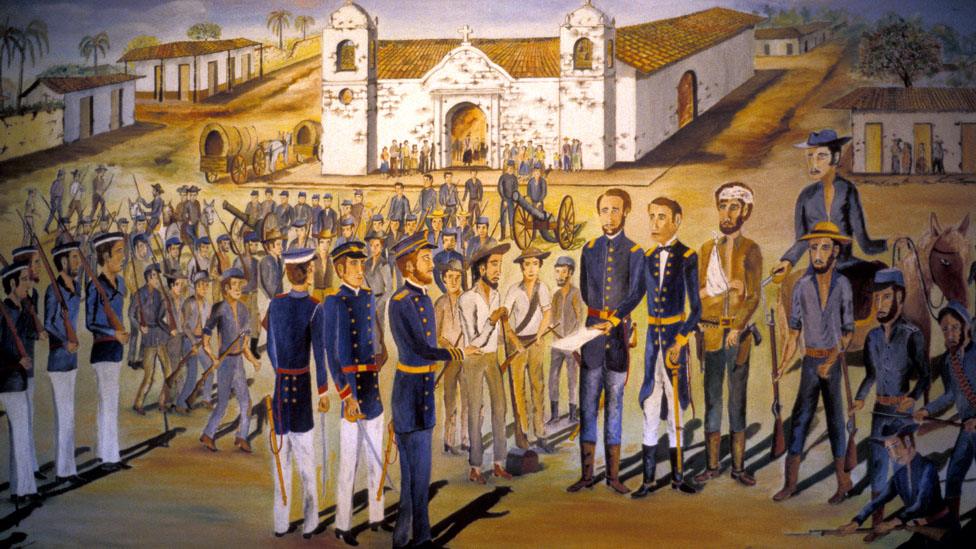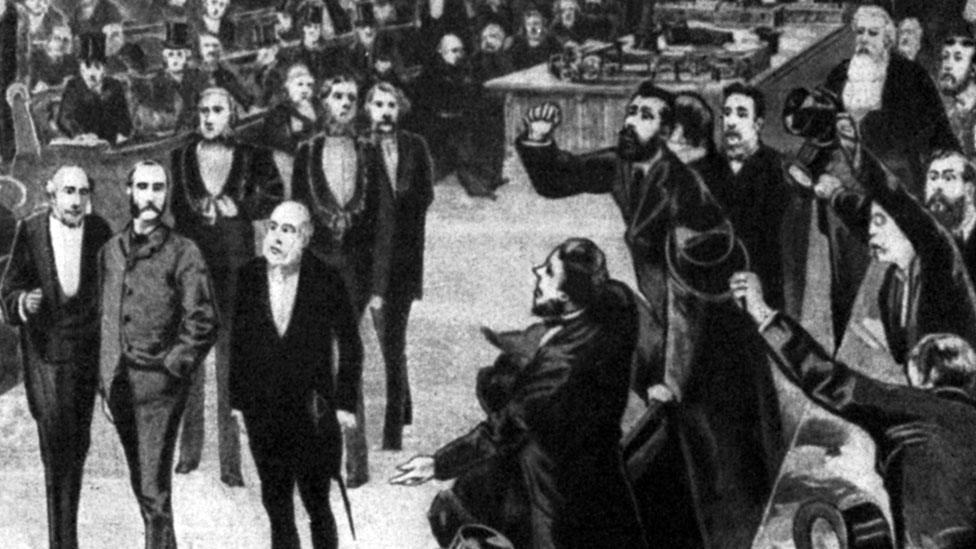The Vocabularist: The roots of the filibuster
- Published

The arch-filibuster William Walker (the tall one in the middle) surrenders after the battle of Rivas in 1856
Korean MPs claim to have broken the record for filibustering - speaking in relays for 192 hours in a failed bid to defeat an anti-terror bill.
The Koreans quoted chunks of "1984" in their orations. British parliamentarians have strung out proceedings talking about their childhood drinking-mugs, and breaking down government statistics into prime numbers.
Where does "filibuster" come from? It used to mean bandit, then pirate - a version of the Dutch vrijbuiter meaning something like "free stealer". The first part is the same as our "free", the second related to "booty".
That gave us "freebooter", and also "filibuster" via a game of linguistic musical chairs that saw either the English or the Dutch become French flibustier, which turned into the Spanish "filibustero" during the 17th Century.
By the 1850s filibuster was used to describe soldiers of fortune, mostly those from the US who mounted attacks on neighbouring territories in bids to annex them or carve out fiefdoms for themselves - like William Walker, who briefly became president of Nicaragua.
On 3 January 1853, the US Congress was debating the prospects for annexing Cuba.
Representative Abraham Venable of North Carolina condemned the project and any party which adopted the principles of filibustering - and any policy which would "make the United States the brigands of the world".
Fellow-congressman Albert Brown of Mississippi said he was dismayed to see Venable "filibustering, as I thought, against the United States", external.

Charles Stewart Parnell being suspended from the Commons in 1881. US newspapers called the Irish tactics filibustering; British journalists slowly followed suit.
That is generally reckoned to be when "filibuster" began its transition from military marauder to legislative guerrilla.
Both uses were common in newspapers for the rest of the century. British papers used the term to describe rough-house American politics with a kind of amused detachment.
"The Democrats… endeavoured to resist the Bill by 'filibustering,' that is, by obstruction - but they were beaten by a new rule of procedure which we do not thoroughly understand," the Spectator reported candidly in 1883.
The use of the term to describe tactics in the UK parliament began with the fight by nationalist MPs led by Charles Stewart Parnell to obstruct coercive legislation on Ireland.
US newspapers had been calling the Irish tactics "filibustering" since the 1870s but British papers were reluctant to follow suit. Perhaps they regarded the term as something uniquely American, like caucuses or mugwumps.
The campaign reached its climax at the beginning of February 1881 when the House of Commons was kept sitting for 41 hours - and now a few British papers began to apply the term to their own legislators.
"The Irish members continued their filibustering tactics throughout Tuesday night, two of them occupying more than four hours and a half in... their speeches," said the Bristol Mercury.
The Western Mail said on 2 February that the "filibustering campaign" was still going on as it went to press and complained about the "degrading spectacle" presented to the people at home and abroad.
And it's a practice that continues to divide opinion. Sharply.

The Vocabularist
Select topic "language" to follow the Vocabularist on the BBC News app

Subscribe to the BBC News Magazine's email newsletter, external to get articles sent to your inbox.